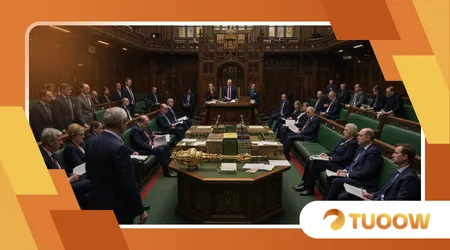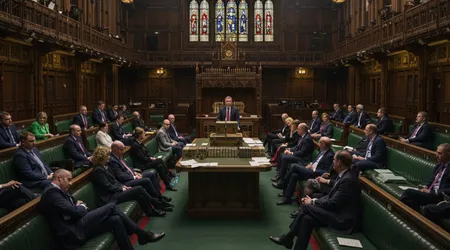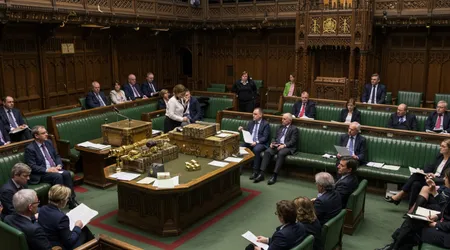UK Parliament Holds Final Vote on Major Data Regulation Reform Bill

The Data Law Reform debate reached its climax on May 7, 2025, as the UK Parliament held its final vote on the Data (Use and Access) Bill.
This landmark legislation promises to reshape how data is managed, balancing economic growth with privacy rights.
With global tech giants watching and citizens concerned about surveillance, the stakes couldn’t be higher. Why does this bill matter now, and what does it mean for the UK’s future?
This vote wasn’t just a procedural step; it was a battleground for competing visions of data governance.
From artists decrying copyright erosion to trans communities fearing privacy breaches, the bill sparked fierce debate.
The Labour government, under Keir Starmer, pushed for modernization, but critics argued it risked weakening protections.
Let’s unpack the nuances, implications, and what’s next for this pivotal Data Law Reform.
The Context: Why Data Law Reform Matters in 2025
Digital transformation defines 2025. From AI-driven healthcare to smart cities, data fuels progress.
Yet, outdated regulations stifle innovation and expose vulnerabilities.
The Data (Use and Access) Bill aims to replace the GDPR-era framework with a agile system. It’s a bold move, but not without controversy.
The UK’s post-Brexit landscape demands competitive edge.
The government claims Data Law Reform will unlock £10 billion in economic growth by 2030, per a 2024 Department for Science, Innovation and Technology report.
Streamlined data sharing could boost sectors like fintech and research. But critics warn of rushed changes undermining trust.
Public sentiment is mixed. Posts on X reveal fears of “Big Brother” surveillance, while businesses cheer reduced red tape.
++ UK Parliament Debates and Extends Pub Hours for 80th Anniversary of VE Day
The bill’s timing, amid global AI races, makes it a geopolitical chess move. Can the UK lead without sacrificing ethics?
Consider a hospital using AI to predict patient outcomes. Current laws limit data sharing, delaying life-saving insights.
Data Law Reform could enable secure, anonymized data pools. But without robust safeguards, that same data could be misused, eroding patient trust. The bill’s success hinges on this balance.

The Bill’s Core Proposals: Innovation vs. Protection
At its heart, the Data (Use and Access) Bill seeks to modernize data flows.
Key proposals include simplified compliance for businesses, enhanced law enforcement data access, and new AI transparency rules. It’s a tightrope walk between progress and privacy.
For businesses, Data Law Reform cuts bureaucratic knots. Small firms, often crippled by GDPR’s complexity, could save millions in compliance costs.
The bill introduces “smart data” schemes, letting consumers share data securely like banking details for better loan offers. Imagine a startup offering personalized energy plans; this could be its lifeline.
Also read: Premier League Season 2025/26
Yet, the creative sector is up in arms. Artists like Elton John criticized early drafts for weakening copyright protections, fearing AI firms could exploit works without consent.
The Guardian reported on May 4, 2025, that ministers backtracked, promising economic impact assessments. This concession shows the bill’s volatility.
Privacy advocates sound louder alarms. The Open Rights Group, via X, warned the bill reduces AI transparency and expands police powers without oversight.
A proposed amendment, NC21, aimed to record only sex at birth, sparking trans rights concerns. It was defeated 363 to 97, per Parliament records, but exposed deep societal divides.
Read more: UK Music Festivals and Concerts 2025
Law enforcement’s expanded data access raises eyebrows. The bill allows broader surveillance for “public safety,” but vague terms invite abuse.
Picture a local council accessing your smart home data to monitor “suspicious” behavior. Without clear limits, Data Law Reform risks overreach.
| Proposal | Benefit | Risk |
|---|---|---|
| Simplified Business Compliance | Reduced costs, innovation boost | Weakened consumer protections |
| Smart Data Schemes | Empowered consumers, market growth | Data breaches, misuse by firms |
| Enhanced Police Data Access | Improved crime prevention | Surveillance overreach, privacy loss |
| AI Transparency Rules | Ethical AI development | Reduced accountability for developers |
This table underscores the bill’s dual-edged nature. Each proposal carries transformative potential but demands ironclad safeguards.
The Parliamentary Showdown: Tensions and Triumphs
The May 7 vote wasn’t just a formality it was a spectacle of democracy. MPs clashed over amendments, with Labour’s majority shaping the outcome.
The defeat of NC21, a divisive trans-related clause, marked a win for inclusivity but didn’t quell all fears.
Lady Kidron’s copyright amendments, championed by artists, faced resistance. The Guardian noted on April 30, 2025, that ministers offered a 12-month review to appease creators.
This delay frustrated industry leaders like Owen Meredith, who called it “moving very slow” in a fast-evolving world.
The creative sector’s influence shows Data Law Reform isn’t just tech policy it’s cultural.
The Liberal Democrats, led by Tim Clement-Jones, threatened to derail the bill in the Lords.
Their tech spokesperson hinted at a full rejection, citing inadequate checks on AI and police powers. This opposition reflects broader unease about Labour’s regulatory pace.
Public reaction, amplified on X, ranged from cautious optimism to outright distrust. One user likened the bill to “handing your diary to a stranger.”
This analogy captures the visceral fear of data exposure. Yet, businesses posted about “unlocking potential,” highlighting the bill’s economic allure.
The vote’s passage, driven by Labour’s 411 seats, wasn’t surprising.
But the debates exposed fault lines between innovation and ethics, state power and individual rights. The bill now heads to royal assent, but its implementation will face scrutiny.
Global Implications: The UK’s Data Gambit
In a world where data is currency, the UK’s Data Law Reform is a bold play.
Countries like the EU, with its stringent AI Act, and the US, with its patchwork regulations, are watching. The bill could position the UK as a data hub, attracting tech giants and startups alike.
Brexit freed the UK to diverge from GDPR, but alignment with global standards remains crucial. The bill’s “data adequacy” with the EU is under review, per a 2025 European Commission brief.
Losing this could disrupt cross-border data flows, hitting industries like e-commerce. The UK’s gamble is to innovate without isolation.
China’s state-controlled data model looms as a cautionary tale. The bill’s loose police powers risk sliding toward authoritarianism, alienating allies.
Conversely, Singapore’s nimble data laws offer a blueprint light regulation with strong ethics. The UK must carve a unique path.
Think of a British AI startup competing with Silicon Valley. Data Law Reform could give it access to vast datasets, fueling breakthroughs.
But if privacy scandals erupt, global trust in UK tech could collapse. The bill’s legacy depends on execution.

What’s Next: Implementation and Accountability
With the bill passed, the real work begins. Regulators like the ICO face pressure to enforce new rules without stifling innovation.
Businesses must adapt to “smart data” frameworks, while citizens need clarity on their rights. The government’s promised reviews on copyright, AI, and privacy will shape public trust.
The ICO’s 2024 budget of £85 million, dwarfed by tech giants’ revenues, raises doubts about enforcement. A 2025 report by the National Audit Office flagged underfunding as a risk.
Without resources, Data Law Reform could falter, leaving loopholes for exploitation.
Civil society will play watchdog. Groups like the Open Rights Group plan campaigns to monitor AI transparency.
Citizens, empowered by “smart data,” could demand accountability like rejecting firms that mishandle data. This shift could redefine corporate responsibility.
Implementation timelines are tight. The government aims for full rollout by 2026, per ministerial statements.
Delays, as seen with copyright reviews, could erode confidence. The bill’s success hinges on transparency and agility.
The Human Cost: Balancing Progress with Trust
Beyond policy, Data Law Reform is about people. A 2025 YouGov poll found 62% of Britons worry about data privacy, up from 55% in 2023.
This statistic reflects growing unease in a hyper-connected world. The bill must address these fears to succeed.
Consider Sarah, a teacher whose school uses AI to track student performance. The bill could enable better tools, but a data breach could expose her pupils’ records.
Her trust in the system is fragile, and she’s not alone. Restoring confidence requires more than legislation it demands empathy.
Then there’s Tom, a musician whose work fuels AI platforms. Without strong copyright rules, his livelihood is at risk.
The bill’s concessions offer hope, but only if enforced. These human stories ground the debate in reality.
The government must communicate clearly. Jargon-heavy policies alienate citizens.
A campaign explaining “smart data” benefits like faster NHS diagnoses could bridge the gap. Trust, once lost, is hard to regain.
Engaging the Future: A Call to Action
The Data (Use and Access) Bill isn’t just a law it’s a vision for the UK’s digital future. Its passage marks a milestone, but the journey is far from over.
Will we embrace innovation without sacrificing our values? The answer lies in collective vigilance.
Citizens must hold regulators accountable. Businesses should champion ethical data use. Policymakers need to listen, not dictate.
The bill’s flaws vague police powers, delayed reviews demand scrutiny. Its strengths economic potential, consumer empowerment deserve nurturing.
Picture a tightrope walker crossing a canyon. That’s the UK navigating Data Law Reform.
One misstep could plunge us into distrust; steady focus could lead to greatness. Let’s choose the latter, together.
Frequently Asked Questions
What is the Data (Use and Access) Bill?
It’s a 2025 UK law reforming data regulations, replacing GDPR-era rules to boost innovation while aiming to protect privacy and rights.
**How does *Data Law Reform* affect me?**
It could simplify services like banking or healthcare through “smart data” but risks privacy if safeguards fail. Stay informed and demand transparency.
Why was the NC21 amendment controversial?
NC21 proposed recording only sex at birth, raising trans privacy fears. Defeated 363-97, it highlighted tensions over data and identity.
When will the bill take effect?
Full implementation is targeted for 2026, with phased rollouts starting late 2025, per government plans. Delays could impact outcomes.
Can I trust companies with my data under this bill?
The bill empowers consumers to control data sharing, but trust depends on enforcement. Research firms’ data practices before consenting.
